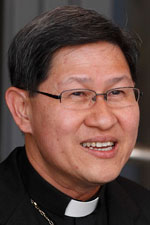
Cardinal Luis Tagle
VATICAN CITY (CNS) — A more Christian, as well as more effective, approach to the global migration crisis would be to move from a concern about “national security” to a concern for “common security,” Cardinal Luis Antonio Tagle of Manila told participants at a Vatican conference.
The cardinal, who also serves as president of Caritas Internationalis, the umbrella organization for national Catholic charities, spoke April 4 at a conference marking the 50th anniversary of Blessed Paul VI’s encyclical, “Populorum Progressio.”
The document, Cardinal Tagle said, urges a recognition that questions of poverty, development and migration are not matters of statistics and programs, but involve the lives of real people and their God-given dignity.
[hotblock]
Keeping the people at the center of focus means looking at the causes of migration, its consequences, “the wounds it inflicts, the social costs on families and countries of origin and destination,” he said.
“You know,” the cardinal said, “it is not always the case that the forced migrant’s departure from a miserable condition changes their lives automatically for the better when they reach their destination. The initial causes of displacement are often replaced by other vulnerabilities like security issues, threats, exploitation, scapegoating — every problem is attributed to migrants — conflicts.”
“The life of a forced migrant,” he said, “is a pilgrimage, leaving a past with hope for a future of peace, a fuller life of integral human development.”
To combat a fear of migrants or the fear that they may impinge on the security and economic well-being of their host communities, the cardinal said Catholics must foster a “point of encounter” with migrants based on “our common humanity, our common aspiration for fullness of life, and hopefully this will lead to a common commitment to fight the globalization of indifference and to promote integral development for all human beings.”
The approach of a Christian and of a vision of integral human development, “includes growth in mutual respect, dialogue, friendship and solidarity,” he said. It means shifting from a concern primarily about “national security in responding to migrants and refugees to common security that leads to an exploration of the interrelationships between countries of origin and destination.”
Such an approach, he said, urges international action in response to the large-scale movement of people — assisting in resettlement efforts, but also focusing on addressing the problems that make people feel they have no choice but to leave their homelands.
[hotblock2]
“For the church, the question of migrants, integral human development and peace calls for a spirituality and theology,” which has strong biblical foundations, beginning with God’s call to Abraham to leave his homeland and including the Israelites’ wandering for 40 years in the desert, the cardinal said. “The Exodus shows us that migration acquires sense and meaning if it is placed within the plan of God.”
A spirituality of migration holds tight to “memory and hospitality,” remembering how each person or someone in his or her family was welcomed to a new land and celebrates the gift of either giving or receiving hospitality, he said. “Forgetfulness of one’s wanderings as a migrant might lead to an unwelcoming stance toward other migrants.”
But even more, Cardinal Tagle said, Jesus identifies himself with strangers — “I was a stranger and you welcomed me” — and makes it clear that Christians will be judged on their attitude toward migrants and refugees.
PREVIOUS: Cross is sign of God’s love, not just a shiny trinket, pope says
NEXT: Peruvian court: Indigenous communities must be consulted before drilling



Share this story